

Google pays US states $17m to settle Apple web browser tracking complaint. Google is paying $17m to 37 US states and the District of Columbia as compensation for snooping on millions of people by subverting Apple's web browser in 2011 and 2012.
The settlement, announced on Monday evening, follows a record $22.5m fine handed out to the search giant in August 2012 over the same complaint by the US Federal Trade Commission. The settlement came after Google admitted in 2012 that it had circumvented protections built into Apple's Safari browser on the iPhone, iPad and Mac to track users via its DoubleClick advertising network. Apple's default settings ban sites which users have not visited from setting "cookies", small text files with information about the user and site, on their machine.
Isohunt search engine for Bittorrent to shut down and pay MPAA $110m. Isohunt, the third most popular search engine for Bittorrent files, will close and pay the Motion Pictures Association of America (MPAA) $110m, ending a long-runng legal battle.
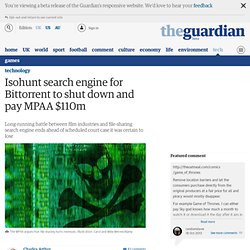
Apple TV rumours won't go away. Rumours that Apple will unveil a TV set won't go away.
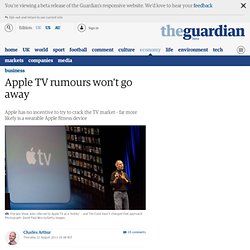
Martinique - Epidémie de dengue 2013. Disclaimers:
Martinique - Epidémie de dengue 2013. Boot up: Pirate Bay proxies blocked, Google Glass teardown, iOS 7 and more. A burst of 8 links for you to chew over, as picked by the Technology team UK ISPs secretly start blocking torrent site proxies >> TorrentFreak Several UK Internet providers have quietly added a list of new sites to their secretive anti-piracy blocklists.
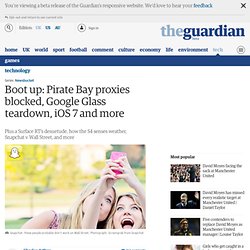
Following in the footsteps of Sky, the first ISP to initiate a proxy blockade, Virgin, BT and several other providers now restrict access to several torrent site proxies. Boot up: HTC's green move, Samsung's China problem, anti-NRA app petition and more. A quick burst of 10 links for you to chew over, as picked by the Technology team O2 urges rivals to stop providing chargers with new phones >> The Guardian O2 has urged its industry peers to stop giving away chargers with new mobile phones, after a trial found the vast majority of customers were happy to buy handsets without chargers.
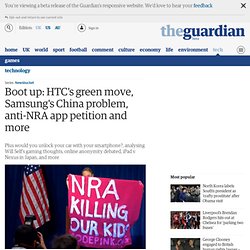
Apple sells 2m iPhone 5s in China. Apple has confounded Wall Street's expectations by announcing it sold more than 2m iPhone 5s in China, a record for the company, after a launch on Friday that observers had thought low-key.

Chief executive Tim Cook said the sales – which were allotted by online lottery to defeat gangs who buy and resell the handsets – had been "the best first weekend sales ever in China" in a statement. Sources including Shanghai Daily said that even if Apple's stores were comparatively quiet, its carrier partners selling the iPhone 5 had a busy weekend, with people signing up to buy the handsets with contracts through China Unicom and China Telecom. Before the launch, China Unicom had had 300,000 preorders for the device, compared with the 200,000 it had for the iPhone 4S in January.
Even so, Apple's stock was downgraded by at least one analyst, as Citi Research cut its recommendation from "buy" to "neutral", suggesting people shouldn't buy or sell it. Now Facebook wants to put adverts in your NEWSFEED. Will allow ANY firm to advertise on newsfeeds for the first timeSocial networking giant already testing new scheme with 'tiny' number of usersCould eventually be forced on all users of the siteComes as employees are to be allowed to sell stock for the first time on Thursday By Mark Prigg Published: 13:50 GMT, 15 August 2012 | Updated: 18:21 GMT, 15 August 2012.

The dark side of Facebook. Facebook, Google and Twitter: custodians of our most intimate se. The next time you hear the phrase "internet privacy", don't think of teenage infatuations heatedly committed to Facebook, of lads puking down their Ted Bakers and sticking the cameraphone footage on YouTube, or of some hack writer tweeting about the progress of his colonic cancer.
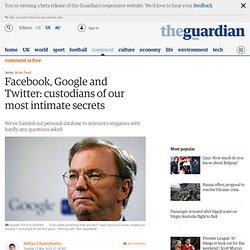
No, consider instead AOL Subscriber 4417749. In summer 2006, AOL did something unprecedented in the history of the internet: it published a database showing what 658,000 members had searched for over three months. A mammoth exercise, this was also one of the most uncynical ever undertaken by a billion-dollar company – AOL shared the information for free, in the hope it would help researchers understand how people were using the web. Make Up Your Mind Facebook, Because Your Privacy Controls Are A. Since last week’s chat exploit, I’ve received further tips of Facebook ‘security bugs’.
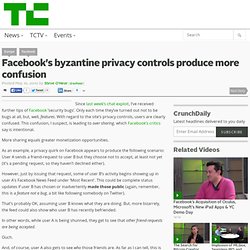
Only each time they’ve turned out not to be bugs at all, but, well, features. With regard to the site’s privacy controls, users are clearly confused. Facebook to court: Likes are protected by First Amendment. When you "like" something on Facebook, that expression is indeed covered by the First Amendment, Facebook is arguing in a new court document. The friend-of-the-court brief, filed last night, also urges an appeals court to vacate a recent ruling by a judge in Virginia that Facebook "likes" are not protected speech .
In that ruling in the spring, U.S. Facebook refuses to help investigation of missing teenage girl. If a Facebook Like is an expression of free speech - what are we actually saying? A story broke this week about a US court case in Virginia where a sheriff’s deputy ‘liked’ his boss’ political opponent’s page. His boss fired him. The deputy, Daniel Ray Carter, sued, saying his ‘Like’ was protected by the First Amendment. FTC Accuses Facebook Of Misleading Developers Over Security. An investigation by the U.S. Federal Trade Commission (FTC) has suggested that the social networking site fell short in reviewing and verifying applications, and therefore "deceived" developers over security ratings. When developers passed along an application into the now-closed verified apps scheme, it is reported that the social networking site was paid up to $95,000 in order to give software green 'ticks' of approval.
By doing so, individual applications were given a "test for trustworthy user experiences" by Facebook. Germany: Facebook must destroy facial recognition database. German data protection officials today accused Facebook of “illegally compiling a vast photo database of users without their consent” and demanded that the social network destroy its archive of files based on facial recognition technology, the New York Times reported.
Facebook says that it uses face recognition software to match users’ photos to others and suggest friends to tag in those photos. A user can prevent friends from seeing tag suggestions when they upload photos that look like that user. But this requires opting out through Facebook privacy settings, which Germany notes is a violation of European law.